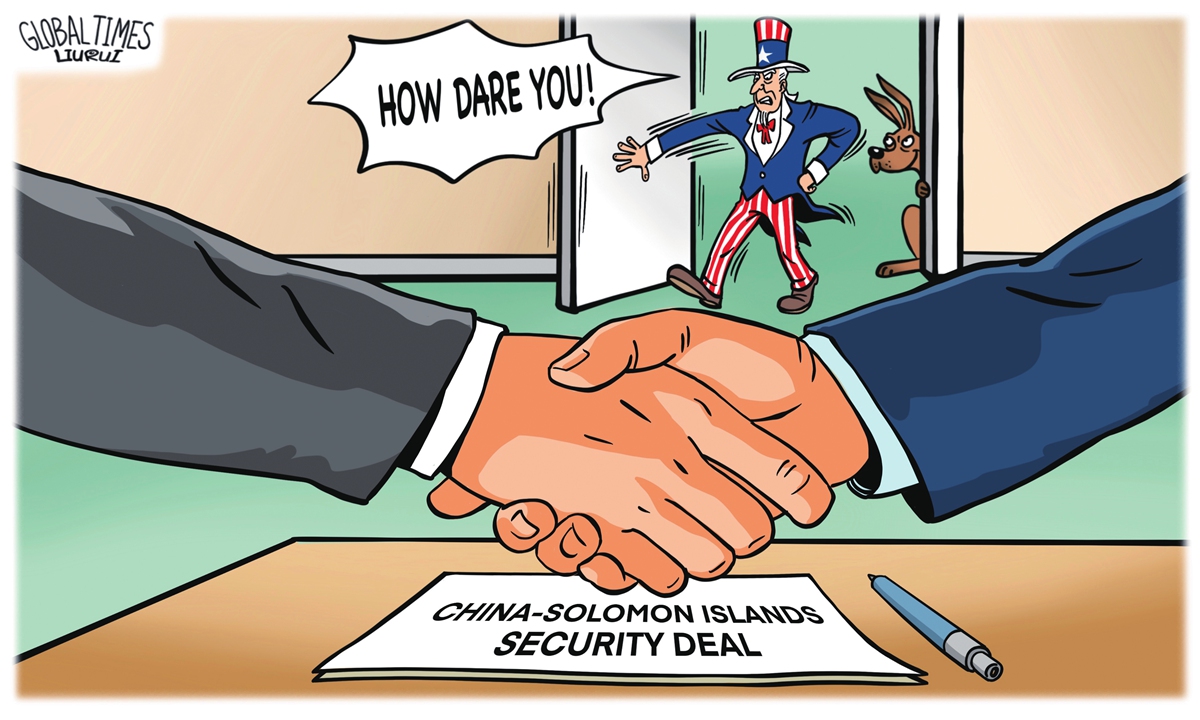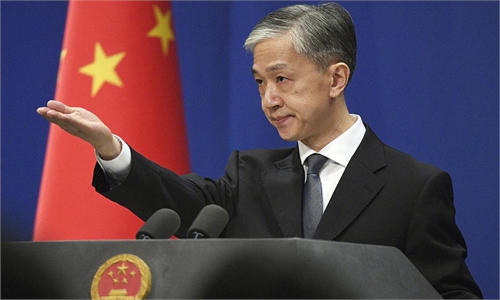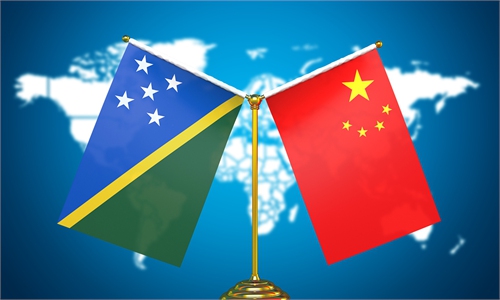
The Western media started the smearing campaign against the security cooperation deal between China and the Solomon Islands even before the pact was signed on Wednesday, and now their attacks are becoming increasingly fiercer.
Australian media outlets even blatantly said, "Australia must be willing to invade the Solomon Islands and topple its government if that's what is necessary." Meanwhile, The Diplomat magazine said it's time for the US to "step up in Solomon Islands," implying Washington should do something as "Solomon Islands is soon to hold a national election."
While the US and its allies repeatedly voice the importance of the so-called rules-based international order, they have kept slapping themselves in the face with their malicious moves. Recently, the world has seen the US and Australia's brutal interference in Solomon Islands' sovereignty. They are using the decision of a sovereign state to hype the "China threat theory," trying to depict China as the "culprit" destabilizing the Pacific and even the entire world. However, it is more than clear who is the real evil.
Certain Australian politicians should not create security anxiety and nuclear proliferation risks in the region and not promote the Cold War mentality, instead they should listen to the Pacific Island countries' call for regional security, stability and sustainable development, Chinese Foreign Ministry spokesperson Zhao Lijian said on Friday. Canberra should respect the independent right of Pacific Island countries to conduct bilateral cooperation, and seriously reflect on the numerous disasters its coercive diplomacy has brought to the people of those countries, Zhao noted.
This intervention is a purely hegemonic act, putting the US and Australia's strategic intentions above the sovereignty of a small country, said Chen Hong, president of the Chinese Association of Australian Studies and director of the Australian Studies Center at the East China Normal University.
"When the Solomon Islands' government has clearly stated its position, the US and Australia repeatedly sent government officials to put pressure on it. They wouldn't give up until their goal is achieved, completely ignoring the stance of the Solomon Islands," Chen told the Global Times. Such coercion and bullying are challenging the norms of international engagement, he said.
In the eyes of the US, which is hysterical of confrontation, everywhere can be the arena against China. They treat the Solomon Islands as a pawn in their geopolitical calculation. The US and Australia are indifferent to interrupting democracy and overthrowing the Solomon Islands government through invasion or instigating the country's opposition. This is extremely disrespectful and constitutes a serious violation of the interests of the Solomon Islands and its people. It is ironic to see the US and Australia, who have vowed to defend freedom and democracy, engage in such bullying.
Bob Menendez, chairman of the US Foreign Relations Committee and a Democratic senator, called on the people's right to choose but that didn't include allowing the Solomon Islands to choose freely. In their eyes, the Solomon Islands is only free to choose to be a vassal of the US and Australia or to be isolated from the world.
As a matter of fact, the US and Australia's moves not only challenged Solomon Islands' sovereignty and autonomy but also provoked China's diplomacy, which is totally unacceptable to China. The US and Australia's hysteria toward China-Solomon Islands cooperation reflected their extreme paranoia of persecution. This paranoia touched their nerves that made them do anything, including overthrowing the local legitimate government and installing a pro-Australian puppet regime through military invasion.
"Such appeal seems ridiculous, but it is actually frightening if we take a deeper look at it. It reveals the dangerous thinking of Australian elites. This being the case, the international community must be vigilant," Chen noted.
Some Western media and scholars pointed out that the US and Australia cannot convince Pacific Island states not to cooperate with China because they didn't really want to help those countries to develop and prosper. Their support is aimed at safeguarding their own strategic interests in the South Pacific region. This has kept countries like the Solomon Islands from developing.
They project their strategic anxieties into willful bullying of small countries and paranoia and hostility toward China. Sadly, neither the US nor Australia now face up to their misdoings, nor will they reflect on their practices.
In sharp contrast, since the establishment of diplomatic relations between China and the Solomon Islands, the two countries have rapidly promoted mutually beneficial cooperation through means like project assistance, investment and trade under the framework of the China-proposed Belt and Road Initiative.
According to Chen, in this incident, the Solomon Islands' government has adhered to the principle of independence, upheld its sovereignty and national dignity, and showed reasonable restraint under pressure. It has demonstrated admirable diplomatic capability and set a good example for other countries.
"All countries that have been bullied should justifiably expose and condemn this bullying act by the US and Australia in the international community, and demand that the US and Australia should not violate the norms of international relations and interfere in other countries' internal affairs again," Chen noted.
The author is a reporter with the Global Times. opinion@globaltimes.com.cn



